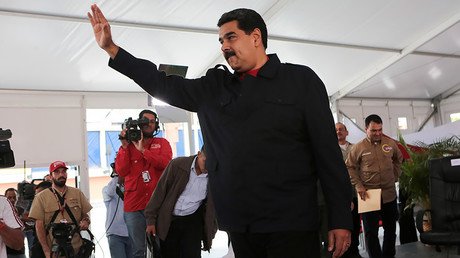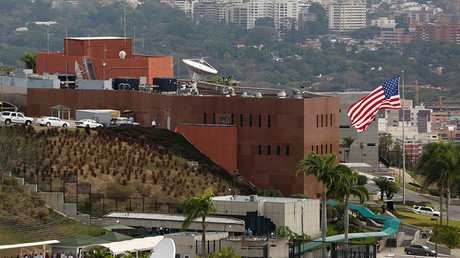Maduro ‘ready for national dialogue’ as vote on Venezuela’s new assembly gripped by violence
Venezuela’s newly-elected Constituent Assembly will be a “place for dialogue,” President Nicolas Maduro pledged after a Sunday vote marred by violence and boycotted by the opposition. The leader stated he is still ready to talk to those “who want peace.”
Maduro noted during an event on Sunday, aired on Venezuela de Television, that the 545-seat Constituent Assembly, which will have the power to draft a new constitution, has legal powers to “deprive the parliamentary immunity of those who should be deprived of it.”
The leftist president said he still “calls for a national dialogue, but only with a good Venezuela that wants peace,” Tass reported.
“I ask our countrymen to close ranks so that the assembly can be a place of dialogue,” Maduro said, cheering the results of the vote. Venezuela's chief prosecutor's office reported 10 deaths in fresh rounds of clashes on Sunday as people in opposition hotbed Caracas rallied against the new assembly, AP and Reuters reported.
Several police officers were also injured in an explosion in eastern part of the city.
ÚLTIMA HORA | Fuerte explosión en la Plaza Francia de Altamira contra fuerzas represivas del régimen de Maduro: Varios PNB heridos #30Julpic.twitter.com/6UD3sYsPE8
— Alberto Rodríguez (@AlbertoRT51) 30 июля 2017 г.
A grenade explosion hit a polling station in the central Venezuelan state of Guarico leaving six people injured, local media reported.
The incident occurred in the city of Valle De La Pascua where assailants threw a grenade at a school where a polling station was located, Venezuela’s 2001.com news outlet reported. It is not clear what the motive behind the attack was. Meanwhile, a mayor of a Caracas municipality and the leader of the ruling socialist party, Jorge Rodriguez, said there was “not one death” related to the voting process.
According to the president of the National Electoral Council Tibisay Lucena, some 8 million people voted to create a controversial Constitutional Assembly, endowing Maduro's ruling socialist party with significantly larger powers.
“The vote was so high, so surprising,” despite the blockades and the “difficulties,” she said as quoted by the Ruptly news agency. The new body is set to be convened within 72 hours of the election.
Members of the opposition for their part claimed that only up to 3 million people voted, with the governor of the central state of Miranda, also a leading opposition figure, Henrique Capriles, urging people to protest Monday against what he called “massacre” and “fraud.”
“We do not recognize this fraudulent process, for us it is null and void,” he said, El Tiempo reported.
“If it didn't mean more crisis, the electoral council's number would almost make you laugh,” opposition leader Freddy Guevara tweeted.
The election followed months of violent protests in Venezuela which resulted in over 100 deaths. The demonstrators have called for an early general election and an end to Maduro's Constituent Assembly plans.
“This Assembly is illegal. No one asked the people whether we want it or not,” one person told RT on Sunday. Another one countered that it was important to cast the ballot in the election. “If we don’t have our republic, we have nothing. We may have a home, food, raise our children, die – there’s no need if we don’t have our republic. That’s why we went to vote,” the man said.
Some simply noted that people are just “tired of violence” and effectively “need peace.” Isabel Frangie, an international attorney, told RT that nothing should stop people from exercising their rights to vote and “apply democracy.”
Maduro said he will use the assembly's powers to bar opposition candidates from running in gubernatorial elections in December if they refuse to negotiate an end to hostilities – which have generated four months of violent protests – with his party.
Two candidates for the assembly were killed this month. Jose Felix Pineda, a 39-year-old pro-Maduro candidate running in the election, was killed in his home in Bolivar state Saturday night. In mid-July, another candidate, Jose Luis Rivas, was killed when he was campaigning in the northern city of Maracay.
US threatens ‘strong swift actions’
A number of states, including Argentina, Canada, the UK and the US, have refused to recognize Sunday's vote and condemned it.
The EU also slammed the vote and said the new body “cannot be part of solution” to the ongoing crisis in Venezuela.
The US State Department said on Sunday in “condemns the elections” since the new body undermines “the Venezuelan people’s right to self-determination.” The US also threatened to proceed with “strong swift actions against the architects of authoritarianism in Venezuela.”
“We care about what the sovereign people of Venezuela say,” Maduro stressed, when talking about US reaction not to recognize the vote.
He repeatedly claimed that the US has its fingerprints on instigating the unrest in his country. Following a recent helicopter attack on Venezuela’s Supreme Court, he said that the action was part of a coup plot that “would have involved the arrival of American ships and troops in Venezuelan waters, on Venezuelan soil.”
“We note with regret that the opposition forces not only failed to respond to the call to participate in the elections, but also tried to block them, provoking some clashes that caused human casualties. We urge the parties to end the senseless violent struggle,” the Russian Foreign Ministry said in a statement, adding that the vote was conducted on a legal basis and without any foreign interference.
The ministry also called on the international community to refrain from rejecting the results of the elections and other “destructive plans” to pressure Caracas, as this could “deepen polarization in [Venezuelan] society.”
Opposition boycott of vote ‘triggered violence’
Sunday elections to the Constituent Assembly have split Venezuelan public opinion. While the opposition forces, which have a majority in the parliament, the National Assembly, boycotted the vote, calling the new body unconstitutional, government supporters challenged its decision to abstain.
Speaking to RT just days ahead of the vote, a former Venezuelan permanent representative to the UN and prominent opposition figure, Diego Aria, said the vote is aimed at overriding the opposition-controlled parliament by the “unconstitutional” elections.
In contrast, a co-writer of ‘The Empire Files’ TV program and political activist Mike Prysner argued that the opposition had every chance to participate in the democratic process, but chose to abstain from it and trigger violence instead.
“It’s an open democratic process and the opposition can run their own candidates, and they can participate in it… If they have a majority as they say they do [in the National Assembly], take it easily, run, take the majority of the constituents and shape the constitution.
“Instead, they’ve opposed a democratic process and called for violence in the streets in response,” he stated.














